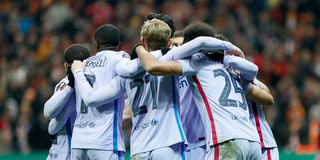Why Clasico could usher in new era for Barca and Real Madrid

Barcelona's players celebrate after scoring their team's second goal during their Uefa Europa League round of 16 second leg match against Galatasaray at the Ali Sami Yen Spor Kompleksi in Istanbul on March 17, 2022.
What you need to know:
- Both head to the Santiago Bernabeu on Sunday with hope that a new era may be about to begin
- Questions still linger about how Madrid replace the likes of Luka Modric, Karim Benzema and Toni Kroos and there is a debate around Carlo Ancelotti
- Barcelona have already taken that bold step by hiring Xavi Hernandez, a risky but needed appointment that has so far paid off
Madrid
Real Madrid will be underdogs in the Champions League quarter-finals and Barcelona will not be there at all, the draw on Friday setting the context for a Clasico of two giants desperately seeking a return to the elite.
Despite their momentous comeback against Paris Saint-Germain, Madrid are still rated fifth favourites in the Champions League this season and were widely considered a good draw for Chelsea, who outplayed them to reach the final last year.
Barca, meanwhile, had to wait another hour to find out their fate in the Europa League, where their chief threats are no longer the likes of Bayern Munich and Manchester City but Leipzig, Atalanta and West Ham.
Certainly, Barcelona's decline has been far more severe but Real Madrid have deteriorated too, a series of underwhelming transfer windows and cautious coaching appointments contributing to an iconic team being allowed to grow old and increasingly stale.
And yet both head to the Santiago Bernabeu on Sunday with hope that a new era may be about to begin.
For Madrid, the greatest optimism comes from the expected arrival of Kylian Mbappe who, in one move, would fast-track them from one generation to the next, the kind of statement signing that could define the club for a decade and force the rest of the team to catch up.
Progressive coach
Questions still linger about how Madrid replace the likes of Luka Modric, Karim Benzema and Toni Kroos and there is a debate around Carlo Ancelotti. A more progressive coach might be better placed to compete with the likes of Pep Guardiola and Jurgen Klopp.
Barcelona have already taken that bold step by hiring Xavi Hernandez, a risky but needed appointment that has so far paid off.
If Madrid's enthusiasm is rooted in a super-star signing, Barca's stems from a forward-thinking coach overseeing the emergence of a hugely exiting crop of youngsters.
Pedri, Ansu Fati, Gavi, Nico Gonzalez and Ronald Araujo could form an impressive core for years to come, with recent performances giving Barca belief they can land a statement victory over Madrid this weekend, at least psychologically, given it will have little bearing on the title race.
A win would also lend evidence to the theory Barcelona are ready to challenge in La Liga next season, even if Europe’s most powerful clubs might still be further off.
Financial woes
The reason for that is Barca's financial woes are far from over.
In fact, La Liga's latest spending restrictions published on Monday had the Catalans' limit reduced from 98 million euros ($107 million) to -144 million euros (-$159 million), which puts into perspective suggestions from the club's president Joan Laporta that they might sign Erling Haaland.
Real Madrid's limit, in stark contrast, was 739 million euros ($818 million) and they believe they can sign both Mbappe and Haaland this summer.
It was perhaps no coincidence then that Barcelona swiftly announced a deal to make Spotify their main sponsor from next season, which it is believed will earn them almost 300 million euros over the next four years.
Negotiations also continue with CVC, the capital investment fund that has struck a 50-year agreement with La Liga for 8 per cent of television income in exchange for an injection of just under 2 billion euros.
Barca are trying to arrange their own bespoke deal that would see them take 300 million euros and, crucially, be able to register the cash as income instead of debt.
There is also the club's wage bill, which stood at 103 per cent of income back in August.
Clever recruitment
Laporta said last month the club has shed 159 million euros from player salaries but that process will have to carry on this summer, with Ousmane Dembele expected to leave while others like Memphis Depay and even Frenkie de Jong may have to be shifted.
In the transfer market, Barcelona's agile, short-term approach that saw them snap up Pierre-Emerick Aubameyang, Dani Alves and Adama Traore is likely to continue.
Chelsea's Cesar Azpilicueta and Andreas Christensen, as well as AC Milan’s Franck Kessie, could all join on free transfers this summer.
With clever recruitment and skilful coaching, Barcelona might well be able to hold their own again domestically but troubling the richest clubs in Europe still feels some way off.
And even with Mbappe, Real Madrid fear the unfettered wealth of the Premier League and state-sponsored clubs will keep them on the fringes of the most rich and powerful, a concern that drives Florentino Perez's continued pursuit of a European Super League.
In the next year, the European Court of Justice will decide if UEFA has the power to prevent clubs like Madrid setting up their own competitions or whether UEFA is exercising an unfair monopoly.
A European Super League is still seen by Real Madrid and Barcelona as the fastest route back to supremacy but regardless, there are reasons to be hopeful. Sunday will serve as a test of progress.




